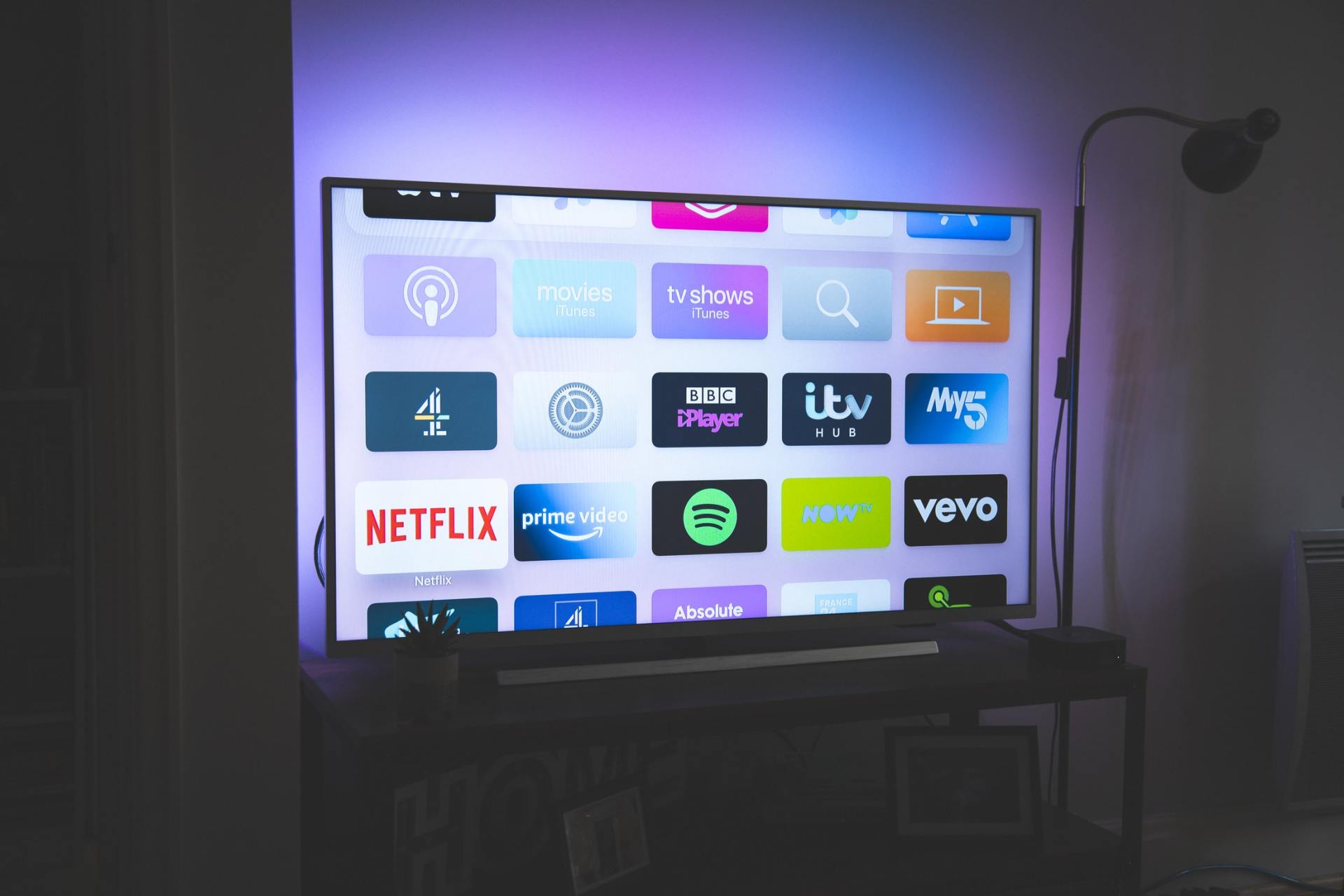Something terrifying happened in my kitchen last week. My daughter hoisted herself halfway onto the counter and reached for a pen against the wall. On her way down, she bumped her elbow, hitting right on her funny bone. She burst into tears.
That wasn't the scary part.
Here's what really shook me up. As she let out her first wail and rounded into a ball in the floor, the first words out of her mouth were, "Mama, can I watch a show?”
Seriously, like mid-scream, the absolute first thing that came into her mind was not physical comfort or emotional support, or even some verbal proclamation of pain. It was TELEVISION.
She's never had that kind of Pavlov's dog reaction before to an injury (thank goodness) and, at first, I kind of brushed it off, but then I started thinking more and more about her relationship with screens and about our current culture of quick-fix distractions and personalized, immediate conveniences.
Screentime and Our Kids
It would have been tempting to blame the TV—the device itself—for my daughter’s behavior. I can't count the number of times I've rattled off recommendations in my pediatrics clinic about limiting the total amount of time per day parents let their kids use their screens or made suggestions about caring equally about content versus total screen time. Families seem to get that too much and the wrong kind of screen use is bad for their kids.
I practice what I preach, too, most of the time—more science shows, less Sophia The First, a heavy emphasis on learning and positive social skill building à la Daniel Tiger.
This, though, was a different part of the technology revolution I'd never even stopped to consider: not only was I letting my child be entertained by screens, I was letting my child be comforted by screens, too. The screen was a proxy for a bigger, societal problem.
See, we live in a world where it has become incredibly difficult to say “no” to our children because we have so many ways we can say “yes.” Over the first post-millenial decade, the cultural norms around how we navigate our daily tasks have so dramatically changed. There’s increasing pressure on parents to have 1,000 convenient-but unhelpful-ways to keep our kids happy. The Tech Culture of Convenience has rewoven the task of raising children.
"Our culture, in large part, has been influenced by the technological revolution—a series of amazing advancements that have modernized everything from shopping to scheduling doctors’ appointments. But has it all been for the better? It turns out kids who grew up with the technological coming of age (typically born in the early 2000s—the iGen Kids (or GenY Kids)—are struggling as a result of it," says Dr. Kristin Valerius, a child psychologist and director of Sundstrom Clinical Services.
The Evidence: The research backs her up.
First of all, it shows heavy childhood screen use is ubiquitous:
“…Members of this generation are growing up with a smartphone, have an Instagram account before they start high school, and do not remember a time without the internet. The Millenials grew up with the web as well, but it wasn’t ever-present in their lives, at hand at all times, day and night. iGen’s oldest members were early adolescents when the iPhone was introduced, in 2007, and high-school students when the iPad entered the scene, in 2010. A 2017 survey of more than 5000 American teens found that three out of four owned an iPhone.” said Dr. Jean Twenge, a psychologist and researcher, in her 2017 The Atlantic article.
Twenge has been analyzing adolescents’ levels of happiness and wellbeing across generations for over 25 years using the Monitoring the Future Survey. The survey, conducted since the mid-seventies, asks 8th, 10th, and 12th graders about their self-esteem, life satisfaction, and daily activities like tech use. Kids, of course, have always had fluctuations in happiness from year to year but in 2012 something astonishing happened: well-being dropped off dramatically. Not just a little drop off. Like, drop off a cliff drop off and it stayed that way. After 20 years of relative stability in overall happiness, life satisfaction, and self-esteem, it went downhill fast…and never recovered. It didn’t matter the kids’ financial situations, they—across the board—seemed to be having a harder time.
“In all my analysis or generational data—some reaching back to the 1930s—I had never seen anything like it," Twenge said in that same 2017 article in The Atlantic.
Of course, no single event, including the advent of pervasive, individualized technology defines a generation. But the dual increase in mental health concerns and media use seem to be strongly connected. We know that factors like heavy social media use, texting, computer games, and accessing the internet are not the keys to a teen’s happiness. In fact, studies show heavy screen use is actually associated with decreased happiness, whereas things like sports and in-person social interactions are associated with improved life satisfaction.
So, what happened in 2012? Technology with its apps, and devices, and new ways of doing everything became fully infiltrated, that’s what happened. In 2012, the year of the huge drop-off, the proportion of Americans who owned a smartphone surpassed 50 percent. Between 2012 and 2015, the percentage of iGen Youth with smartphones went up from 37 to 73 percent. By 2016, 89% had devices. The changes Twenge saw were not based on ethnicity or on social-economic status, nor suburban or rural location. Across the board, no matter what their demographics, suddenly teens were living on their smartphones.
“I don’t think (we have a problem) because 89% of kids are on their devices,” says Dr. Valerius. “If that were the case then just taking the phone would solve it—but that doesn’t. I believe device usage is a proxy measure for how ubiquitous the individualized convenient way of doing things had become. And in reweaving the task, our parenting job became harder, our kids missed out on important developmental tasks, so that by the time these iGen were teenagers circa 2012 they were showing the stress-fractures of growing up in this Brave New Tech World.”
Everyone talks about how screentime is bad, that devices are bad, but Dr. Valerius thinks that misses the point. By focusing on device-use, we keep parents focused (and yelling at their kids) for how often they are on that device instead of focusing them on how many ways they need to help their kids navigate life…and it keeps parents focus away from themselves and why they are feeling so much pressure to just satisfy their kids at every moment.)
What's REALLY So Bad About Kids Using Screens
It seems we all use our smartphones 24-7, our heads bent down over a small screen, our fingers moving in a perpetual scrolling motion. Deep down, I think we're aware it's probably not the best thing for us, no matter what our age. But is there something specifically bad about personal device use for our young kids or for our parenting? YES.
When we allow technology (and any other knee-jerk easy solutions) to soothe and entertain our kids, we replace patience with immediacy, we limit our kids' abilities to deal with negative emotions on their own, and we give quick-fix, personalized solutions to boredom, reducing our children's abilities to handle less stimulating environments. We take away the opportunity to develop grit.
As a working mom, my family time is limited throughout the week. In the evenings, I'm tired. On the weekends, I'm always hoping for reduced stress, but with two little ones in tow, that's hardly ever the case. Nothing is worse than coming home from an exhausting day at work only to be inundated with tears and squabbling and strife. It’s extremely hard for modern, stressed-out families to "just say no" to letting screens parent our kids in the name of peace and harmony, but I firmly believe that we have to be fully aware of our choices if we want our children to be resilient and our parenting to be successful.
How Do We Manage Screens and Mitigate Their Use?
Dr. Valerius gives some powerful suggestions:
1. Deepen Your Genuine Connection with Your Kids
In this modern world, we have to create space to more deeply connect with our kids. It's not going to happen on its own. We have to be intentional about it. Mealtimes, bedtimes, outings, vacations, holiday rituals—when we focus on using these moments as ways to build community and connection, we glean their true value. Connectedness helps with emotional regulation, self-soothing, and other skills that are lacking from your child’s digital experience.
2. Help your children build a network of people that know them, including their weaknesses
"True relationship and intimacy come from vulnerably failing and then reconciling, not from being fake or perfect all the time," says Dr. Valerius. When you let your kids experience that kind of transparent connection with others, they learn that they have value no matter what, that they don't have to be perfect to be loved.
3. Learn To Value Negative Emotions and Failure in Your Kids and In Yourself
Dr. Valerius says, “You and your child can have different emotions. Your job isn’t to keep your kids happy or to make them mind perfectly. Your job IS to help them trust they will be okay when happiness comes and goes.”
How do we do that? We let our kids be bored and uncertain about how to fill their free time. The creativity and problem solving that happens in that “bored” space is crucial for the sort of coping that they will have to do throughout their adolescence when they want to fill their empty places with 1,000 poor or risky choices. We let our kids be upset occasionally, we let them work through disappointments, we allow them to experience things not going their way early on so that, years down the road, they can handle life's curve balls with more grace and perspective.
“Anger can build intimacy. Stress can build grit. Belonging and love are built on being forgiven (which requires failing and making it right afterward)," says Dr. Valerius.
Of course, letting our kids be bored—given that we could instantly take it away—means that their whining and pestering also fills that space. Constantly. And any good modern mommy has times that they cave just to have a moment of peace. So that’s were Dr. Valerius’ next recommendation comes in…
4. Limit Tech Use:
Under age 2- almost nothingOver 2 years - less than 2 hours a day (preferably under an hour for elementary school kids) but some days with no screen at all. No screens in routine car ride trips or at mealtimesNo screens in bedrooms (except book readers or music without other apps)No personal devices until middle schoolEqually important - screen-free times for parents
It's a New World, Baby
Feeling defeated already as you read this? Don’t be.
First, realize that the way modern moms are often tempted to deal with their kids’ incessant begging to have whatever they need is not some type of character flaw—it’s a product of our kids’ environments: a world where personalization, convenience, and entitlement surrounds them.
“I truly believe it is harder to withstand than our mothers because they couldn’t say yes and we can,” says Dr. Valerius. “Standing firm seems to be an impossible task sometimes for the parents of patients I see—and for myself at times. If we don’t get connected with the task and the emotions it stirs up in us it doesn’t matter what tech limits we know we SHOULD have…we will take a path of lesser resistance.”
My family's screentime dilemmas are not going away anytime soon. Devices are here to stay—for me and for my kids—but I don't have to let them break into our home every other second, invading our lives. With my eye on the future, I'm making a commitment to using screens (as much as possible) as tools instead of trespassers.















